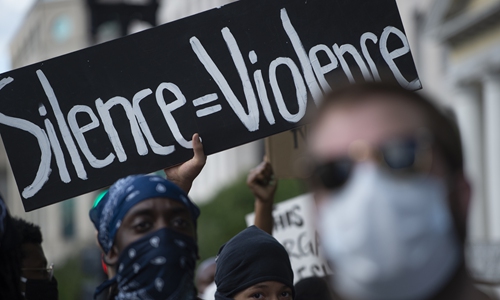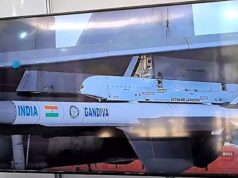Poor, vulnerable hopelessly suffer in US: Global Times editorial

Demonstrators protesting the death of George Floyd hold up placards up near the White House on Sunday in Washington, DC.
The US has just gone through a chaotic weekend, with large-scale violent protests sweeping across many cities. The historic St. John’s Church, 300 meters away from the White House, was one fire, and the White House was also harassed and threatened by demonstrators, both of which are landmark events in the ongoing protests.
But few people believe the chaos would bring any reflection on US politics. It will bring superficial impact and destruction, but the US political structure has been solidified. The US can hardly form any strong force to push forward reforms. The protests are now mainly pushed by African Americans. Yet, even if they are joined by mainstream Americans, perhaps nothing will change.
Racial discrimination has been the most touchy issue among ethnic minorities in the US. But US administrative authority, and most US Congress members, did not take this opportunity to condemn the issue to comfort those hurt. The fundamental reason is that they don’t want to displease the white electorate. The Democratic Party also needs the vote of the white people, so they were also cautious on the issue.
During the riots, a large part of the protesters’ grievances came from the fact that they, as the people at the bottom, suffered most of the pain caused by the novel coronavirus epidemic. Because the campaign strategy of the president’s team is to downplay the pain of the epidemic, the White House has rarely mentioned the epidemic in the past week, except when it needed to exploit the virus to attack China.
The US is not there for ethnic minorities and poor people. Through the epidemic and the attitude of the ruling elites in the riots, people can see that these groups live in desperation. Because the poor have no way to unite under the US system and can easily be divided, their common dissatisfaction has a limited impact on elections, and they have never become the focus of attention of policymakers.
China’s massive poverty alleviation program is just unthinkable in the US. The frosty attitude of capitalism against the vulnerable groups has been laid bare in the past few months. The poor in the US are experiencing a very bad 2020.
Partisan politics has created severe divisions in society. Such divisions restrict and disturb people’s thinking. People’s support for a particular party is only a matter of stance, which provides a shelter to politicians who violate people’s interests.
As elections come and go, it is simply about one group of elites replacing the other. The intertwined interests between the two groups are much greater than those between the victorious one and the electorate who vote for them.
To cover such deception, the key agenda in the US is either a partisan fight or a conflict with foreign countries. The severe racial discrimination and wealth disparities are marginalized topics.
The US presidential election is held once every four years, while the poor actually have no choice. There is no policy that addresses the issue of racial discrimination for them to vote, nor is there any social policy that truly benefits the poor and the vulnerable.
African Americans and people at the bottom protest once in a while, with isolated cases being the fuse of the eruption. But it will not change anything, and they will eventually foot the bill for most of the destruction they make. Before a reasonable solution comes out, this periodic breakout becomes an unavoidable cycle.
Judging from the superficial comments and statements from US politicians on the protests, the outsiders can easily draw the conclusion that solving problems is not on the minds of the country, and elites are just fearlessly waiting for this wave of demonstrations to die out.




